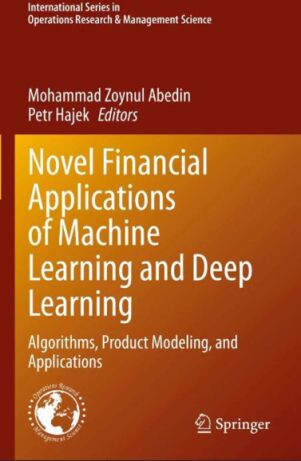书名:Novel financial applications of machine learning and deep learning
责任者:Mohammad Zoynul Abedin | Petr Hajek.
前言
The Novel Financial Applications of Machine Learning and Deep Learning: Algorithms, Product Modelling, and Applications presents the state of the art of the application of machine learning (ML) and deep learning (DL) in the domain of finance. We will present a combination of empirical evidence to diverse fields of finance so that this book is useful to academics, practitioners, and policymakers who are looking to train novel and the most advanced machine learning classifiers. Thus, the purpose of this book is to provide a broad area of applications to different financial assets and markets. Furthermore, from an extensive literature assessment, it is evident that there are no existing textbooks that narrate ML and DL to unlike areas of finance or to an extensive range of products and markets.
Business risk and uncertainty certainly are the toughest challenge in the finance domain faced by many researchers and managers. Such uncertainty thereby initiates an unavoidable risk factor, which is a fundamental element of financial theory. To the best of our knowledge, the financial domain has not been a focused subjectmatter for good ML related books. There is also a scarcity of information about how financial enterprises supervise crisis events and achieve turnaround. In order to fix the multifarious nature of the financial problem, this edited book advocates interdisciplinary approaches based on machine learning.
Machine learning is involved in the analysis of large and multiple feature instances. It principally refers to acquiring knowledge and intelligence (by a computer program) from a processed training example for generating predictions. It deals with computationally intensive techniques, such as cluster analysis, dimensionality reduction, and support vector analysis. It is principally the area of computer science and is already frequently applied in social sciences, finance and banking, marketing research, operations research, and applied sciences. Moreover, computational finance is a domain of applied computer science that is concerned with practical issues in finance. It may be characterized as the study of features, instances, and learning algorithms applied in finance. It is an interdisciplinary area that integrates computational tools with numerical finance. Furthermore, computational finance applies arithmetical proofs that can be fitted to economic experiments, thereby contributing to the advancement of financial data modeling techniques and systems. These computational techniques are utilized in financial risk management, corporate bankruptcy prediction, stock price prediction, and portfolio management. Finally, this proposed textbook could play an important role in financial data learning.
Besides, this volume will be a basis for empirical and theoretical practices. The empirical experiments aim to minimize financial risk and uncertainty by covering and fitting the most advanced and novel machine learning algorithms. Moreover, it generates academic literature as well as financial product and finance modeling inferences toward customer credit risk assessment, data mining, pattern recognition, bankruptcy prediction, and so on. To be specific, the volume is broadly divided into three parts, with the first set of chapters focusing on the recent trend and issues of financial technology (FinTech). The second set of chapters comprises empirical essays on the prediction and forecasting financial risk by applying ML and DL tools and techniques. The third set of chapters combines empirical evidence of financial time-series data forecasting. The volume ends with a set of emerging technologies in financial education and healthcare and their empirical applications.
查看更多
目录
Part I Recent Developments in FinTech
FinTech Risk Management and Monitoring 3
Digital Transformation of Supply Chain with Supportive Culture in Blockchain Environment 17
Integration of Artificial Intelligence Technology in Management Accounting Information System: An Empirical Study 35
The Impact of Big Data on Accounting Practices: Empirical Evidence from Africa 47
Part II Financial Risk Prediction Using Machine Learning
Using Outlier Modification Rule for Improvement of the Performance of Classification Algorithms in the Case of Financial Data 75
Default Risk Prediction Based on Support Vector Machine and Logit Support Vector Machine 93
Predicting Corporate Failure Using Ensemble Extreme Learning Machine 107
Assessing and Predicting Small Enterprises’ Credit Ratings: A Multicriteria Approach 125
Part III Financial Time-Series Forecasting
An Ensemble LGBM (Light Gradient Boosting Machine) Approach for Crude Oil Price Prediction 153
Model Development for Predicting the Crude Oil Price: Comparative Evaluation of Ensemble and Machine Learning Methods 167
Part IV Emerging Technologies in Financial Education and Healthcare
Discovering the Role of M-Learning Among Finance Students: The Future of Online Education 183
Exploring the Role of Mobile Technologies in Higher Education: The Impact of Online Teaching on Traditional Learning 197
Knowledge Mining from Health Data: Application of Feature Selection Approaches 217
查看PDF
查看更多
馆藏单位
中国医科院医学信息研究所



